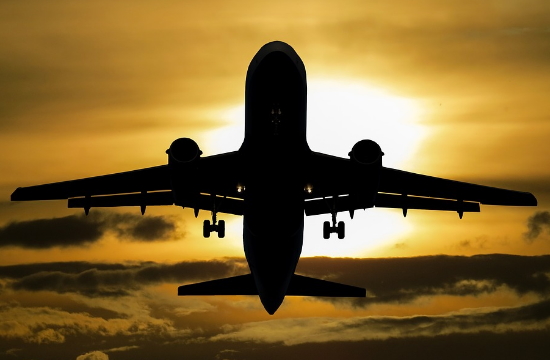Progress on decarbonizing European airlines is driving up ticket prices | TornosNews.gr

The European aviation industry has made “significant progress” over the past two years in meeting its carbon emissions reduction targets, according to a new report from the European Commission and the European Union Aviation Safety Agency (EASA).
The European Commission’s latest environmental report on aviation examined the sector’s progress towards meeting the goals of the European Green Deal, highlighting “significant developments” in the areas of alternative aviation fuels – referred to as sustainable aviation fuels (SAF) – and improvements in air traffic management. The International Civil Aviation Organization (ICAO) target includes a 5% reduction in CO2 emissions from international aviation by 2030.
Already in 2023, flights departing from European airports emitted 133 million tonnes of CO2, 10% less than in 2019. The average mass of CO2 emitted per passenger-kilometer fell to 83 grams in 2023, equivalent to 3.3 liters of fuel per 100 passenger-kilometers.
An interesting fact regarding flights departing from European airports is that while only 6% are long-haul flights (over 4,000 kilometers), they account for 46% of CO2 emissions.
The report also highlights the increase in the number of European airports, from 90 to 118, that have a net zero CO2 emissions target by 2030. Of these, 16 have already achieved their target.
However, more needs to be done to turn sustainability goals into action, as the report warned of the projected increase in demand for air traffic. European air traffic is expected to reach 11.8 million annual flights by 2050, up from 9.9 million in 2023, the report said, but this growth “does not necessarily come at the expense of increasing emissions”, according to the EU’s Directorate-General for Mobility and Transport.
Sustainable fuels drive up costs
The SAF capacity currently being built across Europe could supply the 3.2 megatonnes of SAF required by 2030 under the ReFuelEU aviation supply mandate. However, the European Commission report notes that production will need to “rapidly scale up thereafter.
SAF prices are currently 3 to 10 times more expensive than conventional fuels, although they are expected to come down “significantly” as production technologies scale up.
EASA Executive Director Florian Guillermet said: “A concerted effort is now needed to manage a smooth transition to cleaner aviation while maintaining a high uniform level of safety and connectivity. Honest, transparent, and effective communication is crucial to ensure European citizens’ trust that aviation is indeed acting to become more sustainable and will achieve future goals.”
RELATED TOPICS: Greece, Greek tourism news, Tourism in Greece, Greek islands, Hotels in Greece, Travel to Greece, Greek destinations, Greek travel market, Greek tourism statistics, Greek tourism report
Photo Source: pixabay.com
Related
Brits forced to pay fee to visit these 30 countries…
UK tourists will be required to pay a fee to visit 30 countries in Europe under new European Union (EU) travel rules.The rules mean British holidaymakers will n
The beautiful European island with just 148 locals
Irakleia is a beautiful island in the Minor Cyclades of Greece, nestled in the heart of the Aegean Sea and just an hour away from Naxos. Officially recorded t
Warning issued for Brits flying easyJet and Ryanair to popular…
Passengers flying with Ryanair, easyJet and British Airways should expect disruption (Picture: Urbanandsport/NurPhoto via Getty Images) Passenge










